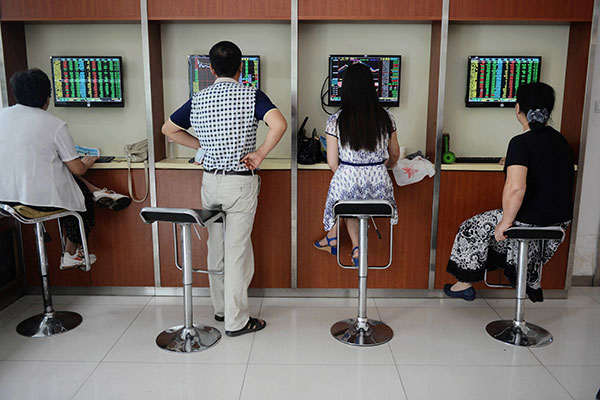Equities slump on economic concerns
By Li Xiang (China Daily) Updated: 2015-08-19 10:07
 |
|
Retail investors check share prices at a brokerage in Qingdao, Shandong province, on Aug 18. The benchmark Shanghai Composite Index plunged by 6.15 percent to close at 3,748.16 points.[Yu Fangping / For China Daily] |
Share prices plunged on Tuesday as jittery investors resorted to huge sell-offs on concerns that the government has halted its plan to buy equities to stabilize the market.
The benchmark Shanghai Composite Index sank by 6.15 percent, or 245.5 points, to close at 3,748.16. It was the biggest loss in three weeks since an 8.5 percent dip on July 27.
State-owned enterprises, which are expected to undergo major ownership reforms, led the decline with more than 1,600 stocks on both the Shanghai and Shenzhen bourses tumbling by the 10 percent daily limit.
The market slump came after the country's securities regulator said on Friday that the State-owned margin lender China Securities Finance Corp will not step into the market unless there are abnormal market fluctuations.
The regulator's announcement has been widely interpreted as a signal that the government is ending its direct intervention and letting the market mechanism play a bigger role after the benchmark rebounded by about 15 percent from a bottom on July 8.
But Tuesday's decline underscored that investors' sentiment remained fragile as a slowing economy and the depreciation of the yuan continued to weigh on the market.
Jiang Chao, an analyst with Haitong Securities Co, said that the monetary authorities appear to be in a dilemma over the easing policies and the monetary uncertainty may continue to destabilize the market.
"There is need to inject more liquidity as the depreciation of the yuan is likely to trigger capital outflows. But the market rescue efforts have led to a surge in the broad monetary supply which created a policy dilemma," he said in a research note.
The recovery of the country's home prices has also dimmed investors' expectation for further monetary easing, some analysts said.
Li Daxiao, chief economist at Yingda Securities Co, urged investors not to overreact to Tuesday's decline, but warned about the risk of excess valuations of companies in the military industry.
Share prices of listed military-related companies have ballooned substantially ahead of the country's military parade commemorating the end of World War II and on expectations of major reforms.
The average valuation of the industry has been ranked the top among all industries with the price-to-earnings ratio of most companies exceeding 100 times, according to estimates.
"There is a big risk of the bubble bursting in military-related stocks, which is even worse than the startup board," Li said.
- 2015 China International Fair for Investment and Trade kicks off in Xiamen
- China's commodity imports robust in Jan-Aug period
- China stocks rebound 2.92%
- 2015 China box office already past 2014 total
- China foreign trade decline widens in August
- Interview: JP Morgan's senior executive bullish on China
- Innovation, development the focus for NZ mayors
- Lives of freelancers

















